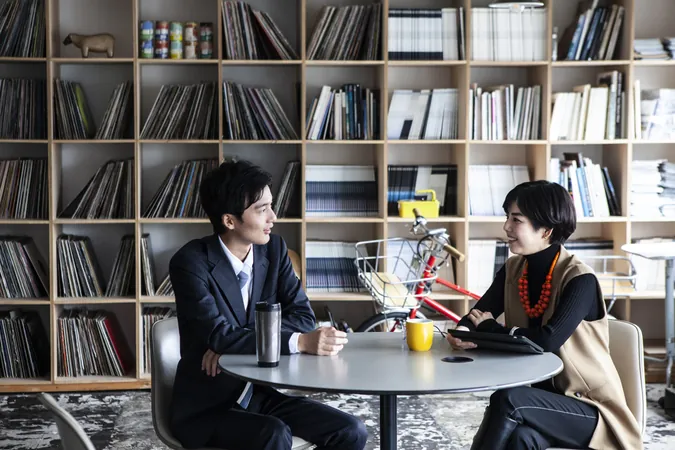
Unlocking the Secrets of Pleasant Conversation: The Art of Listening
2024-11-03
Author: Ming
Introduction
In a world where connections are both abundant and fleeting, the desire to be seen as a pleasant person is more relevant than ever. In the insightful booklet Kanji no ii hito, warui hito (meaning "Pleasant People, Unpleasant People"), counseling psychologist Tatsunari Iota lays out strategies to help individuals foster meaningful interactions in a landscape that often feels daunting.
The Challenges of Modern Communication
Despite centuries of evolution in spoken communication, many people still struggle with forming genuine connections. Iota notes that a common refrain he hears from clients is, "I'm not good at getting along with people," which frequently translates to a deeper insecurity: “I don’t know how to talk to people.” This anxiety persists despite thousands of years of social interaction experience; ironically, the modern "age of communication" could be exacerbating these fears rather than alleviating them.
Evolving Guidelines for Conversations
In today’s fast-paced environment, the guidelines for engaging conversations are continually shifting. Iota explains that words aren’t becoming obsolete, but rather, the way we use them is evolving. For example, the difference between a face-to-face encounter and an online chat is stark. An email lacks the nuances of an in-person conversation, and a social media post often requires a completely different tone. Consequently, many people suffer from what Iota refers to as "communication anxiety," leading to feelings of uncertainty, mind blankness, and second-guessing in social situations.
Impact of the COVID-19 Pandemic
The COVID-19 pandemic has intensified these challenges. With masked faces and remote communications becoming the norm, especially for children, the loss of non-verbal cues has severely impacted how we interpret intentions and emotions. Iota suggests that while the long-term effects of this era are still being assessed, a silver lining might be that children are becoming accustomed to a future that could be more devoid of facial expressions.
The Importance of Listening
To navigate this communication minefield, Iota offers a simple yet profound piece of advice: cultivate your listening skills. This may sound easier said than done, particularly when many of us are naturally inclined to focus on our own interests. He terms this self-centeredness a 'self-disease,' but asserts that we can develop an awareness that allows us to genuinely engage with others despite our personal inclinations.
The Value of Small Talk
For those feeling the weight of conversation pressure, Iota provides an interesting solution: embracing the concept of “small talk.” Often dismissed due to its perceived lack of depth, small talk serves a vital function in relationship-building, providing a bridge to deeper discussions and fostering connections.
The Power of ‘Ne’
One fascinating element Iota introduces is what he calls “the power of ‘ne’”—a versatile Japanese particle that signifies agreement or shared understanding but holds no inherent meaning. This simplicity allows it to adapt to various contexts, making conversations feel more alive and approachable. A typical exchange could morph from the mundane — “It’s been really hot lately, ne?” — to a moment of connection, breaking the ice and paving the way for more substantial dialogue.
Active Listening Skills
Listening, Iota advises, is an active endeavor that should be reflected in our body language and responses. By exhibiting genuine interest, employing nods, and contributing appropriate interjections, we can create a warm and inviting space that encourages more open exchanges. Unlike animals that rely on instinctual sounds for communication, humans hold the unique challenge of wrapping meaning around our spoken language, which can complicate our interactions.
Conclusion
Ultimately, the art of conversation may indeed be a continuous learning process. As we embrace these techniques and insights, we become better equipped to engage with others in a way that transforms anxiety into ease, fostering relationships that may flourish well beyond the initial exchange.
So, let's put down our devices, lean in, and immerse ourselves in the beauty of conversation—because while the words may be civilizationally older than any of us, the need for connection is timeless!



 Brasil (PT)
Brasil (PT)
 Canada (EN)
Canada (EN)
 Chile (ES)
Chile (ES)
 Česko (CS)
Česko (CS)
 대한민국 (KO)
대한민국 (KO)
 España (ES)
España (ES)
 France (FR)
France (FR)
 Hong Kong (EN)
Hong Kong (EN)
 Italia (IT)
Italia (IT)
 日本 (JA)
日本 (JA)
 Magyarország (HU)
Magyarország (HU)
 Norge (NO)
Norge (NO)
 Polska (PL)
Polska (PL)
 Schweiz (DE)
Schweiz (DE)
 Singapore (EN)
Singapore (EN)
 Sverige (SV)
Sverige (SV)
 Suomi (FI)
Suomi (FI)
 Türkiye (TR)
Türkiye (TR)
 الإمارات العربية المتحدة (AR)
الإمارات العربية المتحدة (AR)